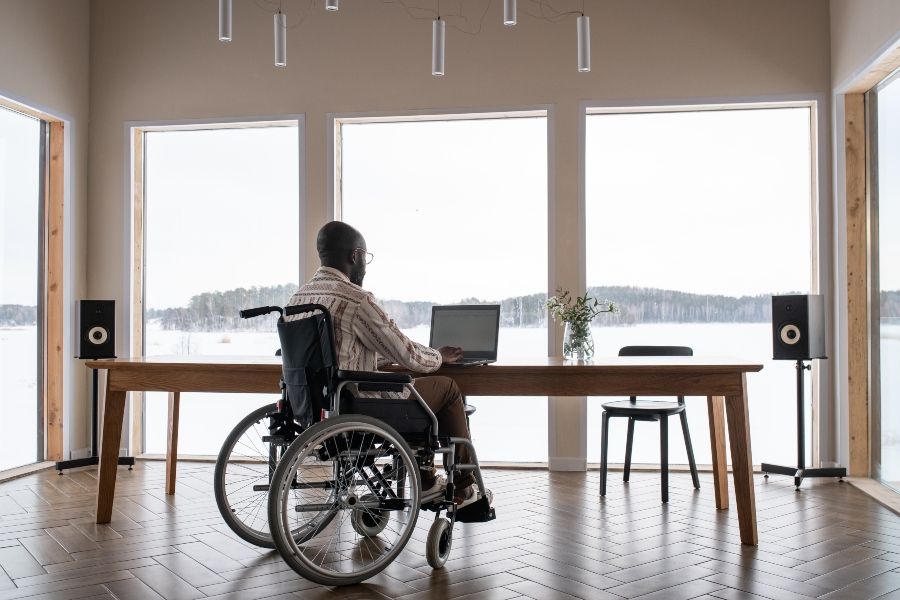Interior designers have known for decades that window treatments are the secret finishing touch. However, for the typical consumer, these functional masterpieces are last in line for room design. With the addition of smart home functionality such as customized, automated scheduling and voice assistant integration, window shades and treatments can do more than homeowners might know. It’s time to shine a light on smart shading.
Consumer demand for smart home offerings has risen rapidly, and lighting and shading is no exception. Recent research from CEDIA indicates that light and shading accounted for 12% of an integrator’s total business revenue last year; that’s compared to just 3% in previous years. This upward trend presents an opportunity for integrators to bring even more consumers into the fold.
Integrators who expand their portfolio of products to offer smart shades will not only stay ahead of the competition, but give homeowners the automation, customization, and style they are searching for. While it can be tempting to leave the option of window treatments completely to the client, this also runs the risk of clients opting for a big-box store smart shade that not only diminishes the elegance of your install but also sacrifices valuable revenue on you project. You don’t need to be a design guru to sell some shades; here are a few tips on walking customers through the process.
Let There Be Light (Or No Light)
Whether it’s too much or too little, natural light is a huge part of every home design. Custom smart shades allow homeowners to take advantage of the light that is already there. A variety of options and features exist to maintain natural sunlight or control the amount of sunlight throughout the day. There are an array of different window treatment styles that will offer homeowners the perfect amount of natural light in their space.
Consider starting by walking your customer through options such as: sheers — fill a room with soft light while maintaining a sense of privacy; roller shades — specially designed to limit UV rays and minimize light gaps for the utmost privacy; wood and metal blinds — provide a view-through without having to be fully raised, simply rotate the slats to control incoming light and privacy. When the right shades are chosen, integration within the overall smart home ecosystem is seamless and enhances the wellness, privacy, energy efficiency, and convenience for each homeowner’s specific needs.
Consider the Function
Window treatments are useful for more than creating a beautiful interior. They can also increase the function of a space. Integrators who determine the function of the room will be able to better steer the customer to the perfect window treatment. Some solutions are ideal for beautifully diffusing sunlight while others are better suited for movie watching or sleeping soundly.
For homeowners who prioritize wellness, shades can offer them the ability to program their shades based on customized daylight conditions throughout each room creating the perfect environment for optimal sleep or productivity. For customers who prioritize privacy and security you’re sure to find a versatile solution that lets the owner preserve as much of the view as required while blocking the outside world from looking in, like popular top down, bottom up shades.
Lastly, many homeowners, especially those seeking to create a smart home may be concerned with energy savings. Window treatments can boost home energy efficiency, while keeping the space comfortable. A home can lose up to 30% of its heating and cooling energy through its windows. Energy-efficient window coverings can help with this energy loss and lowering energy bills. Of course, smart shades also allow homeowners to perfectly time window treatments to be up or down, maximizing natural lighting when needed and thus reducing the need for electric lighting.
Achieve the Aesthetic
Choosing window treatments, including shades, blinds, shutters and drapery can be overwhelming. With so many options to choose from, identifying the right textures, fabrics, and design that match existing décor can seem like a formidable task. However, an integrator doesn’t need to have a background in design to expertly guide their customer on style solutions.
Whether the homeowner is looking for a delightful pop of color or prefers an elegant, refined mood – offering unrivaled customization and near-infinite design possibilities can set each project apart. Having numerous colors, treatments and textures from smooth metal finishes or performance fabrics, to statement fabrics will elevate any room with ease. Take time to explore the different materials and styles and the customer will find their perfect window-treatment solution.
Convenience is the Experience
While the core function of shading is important, the convenience makes it almost magical. Automated shading changes the mood and style of a room at a homeowner’s whim. With so many options to choose from, being able to choose a shading solution with a platform that offers a seamless experience is crucial. Homeowners are looking for an all-inclusive integrated experience.
A platform that allows for options such as scheduled, customized timing, sunrise / sunset schedules for a natural flow, or location-based action for true personalization will level up installations. Homeowners seeking a smart home experience will enjoy having the option to have their shade solutions integrated with the whole-home automation system of their choice, or using the power of voice control, in addition to their smartphone app, for precise control. With the right technology, set up can be easy, and the client will have a solution perfectly tailored to their lifestyle.
Automated window treatments provide a personal, comforting touch to any home and are a growing part of the connected-home market either by themselves or paired with other automation devices. The time to capitalize on the rapidly growing market of light and shading is now. Adding automated window shades uniquely positions integrator portfolios for the smart home boom.
Scott Stephenson is a veteran of the home automation and smart home space, bringing over 14 years of experience in product design to bring solutions that delight both end-users and professionals. Joining Hunter Douglas in 2017, Scott manages the product and integration strategy for all automated shading solutions.
For integrators looking to add smart shading to their portfolio, be sure to visit the Hunter Douglas booth (6027 & 7027) at CEDIA Expo to get a full view of all the shade styles, fabrics and automation options that can bring your projects to the next level.






